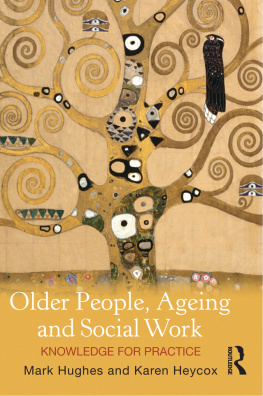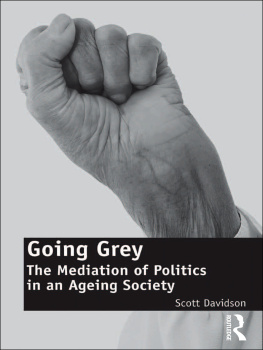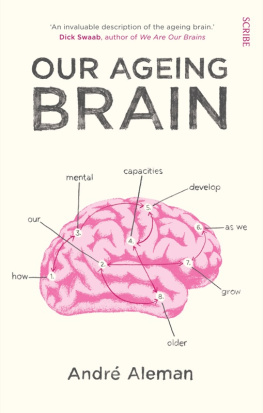
A New Ethic of Older
Through its themes of subjectivity, surgery, and self-stylization this book critically examines the cultural constraints and incitements that shape the practice of cosmetic surgery by older people. The book problematizes anti-ageing discourses to provide a nuanced descriptive, ethical, and political reading of older identity politics nested within the contemporary ethico-political terrain of self-care.
A New Ethic ofOlder aims to de-territorialize the older subject from normative discourses of ageing and theorize becoming older. Evidence of an active cultural politics of older emerges from the critically reflexive engagement of older people with cosmetic surgery. This engagement constitutes a cutting critique of ageing discourses enmeshed in an aesthetic mode of subjectivation that underpins a new ethics of old age.
The book will appeal to those in the fields of Cultural Gerontology, Ageing Studies, Critical Psychology, Sociology, and Cultural Geography. The metho-dological approach will be of interest to academics and students exploring the application of Foucaults work on care of the self to contemporary contexts and practices.
Bridget Garnham is a Research Fellow in the Centre for Social Change within the School of Psychology, Social Work, and Social Policy at the University of South Australia, Australia.
Routledge Key Themes in Health and Society
Available titles include:
Turning Troubles into Problems
Clientization in human services
Edited by Jaber F. Gubrium and Margaretha Jrvinen
Compassionate Communities
Case studies from Britain and Europe
Edited by Klaus Wegleitner, Katharina Heimerl & Allan Kellehear
Exploring Evidence-based Practice
Debates and challenges in nursing
Edited by Martin Lipscomb
On the Politics of Ignorance in Nursing and Healthcare
Knowing ignorance
Amlie Perron and Trudy Rudge
Empowerment
A critique
Kenneth McLaughlin
The Story of Nursing in British Mental Hospitals
Echoes from the corridors
Niall McCrae and Peter Nolan
Living with Mental Disorder
Insights from qualitative research
Jacqueline Corcoran
A New Ethic of Older
Subjectivity, Surgery and Self-stylization
Bridget Garnham
Forthcoming titles include:
Social Theory and Nursing
Edited by Martin Lipscomb
Identity, Ageing and Cultural Adaptation
Understanding longevity in crossdisciplinary perspective
Simon Biggs
A New Ethic of Older
Subjectivity, surgery, and self-stylization
Bridget Garnham
First published 2017
by Routledge
2 Park Square, Milton Park, Abingdon, Oxon OX14 4RN
and by Routledge
711 Third Avenue, New York, NY 10017
Routledge is an imprint of the Taylor & Francis Group, an informa business
2017 B. Garnham
The right of Bridget Garnham to be identified as author of this work has been asserted by her in accordance with sections 77 and 78 of the Copyright, Designs and Patents Act 1988.
All rights reserved. No part of this book may be reprinted or reproduced or utilised in any form or by any electronic, mechanical, or other means, now known or hereafter invented, including photocopying and recording, or in any information storage or retrieval system, without permission in writing from the publishers.
Trademark notice: Product or corporate names may be trademarks or registered trademarks, and are used only for identification and explanation without intent to infringe.
British Library Cataloguing in Publication Data
A catalogue record for this book is available from the British Library
Library of Congress Cataloging in Publication Data
Names: Garnham, Bridget, author.
Title: A new ethic of older : Subjectivity, surgery and self-stylization / =Bridget Garnham.
Description: 1 Edition. | New York : Routledge, 2016. | Series: Routledge key themes in health and society | Includes bibliographical references and index.
Identifiers: LCCN 2016011112 | ISBN 9781472414601 (hardback) | ISBN 9781315565002 (ebook)
Subjects: LCSH: Aging--Psychological aspects. | Aging--Moral and ethical aspects. | Surgery, Plastic. | Self-perception.
Classification: LCC BF724.55.A35 G37 2016 | DDC 306.4/613--dc23
LC record available at https://lccn.loc.gov/2016011112
ISBN: 978-1-4724-1460-1 (hbk)
ISBN: 978-1-315-56500-2 (ebk)
Acknowledgement
I am very grateful to all the people who agreed to be interviewed for this book and for the support that cosmetic surgeons provided which made the research possible. I recall the older people whose perspectives inspired this work with both gratitude and admiration for their vibrancy, forthrightness, and goodwill. I hope this tale does you justice.
My deepest gratitude goes to Vicki Crowley for supporting me through troubled times, for challenging and inspiring me in unfamiliar realms of thought, for liberating my writing voice, and for encouraging my learning and progress. I am humbled by your ethical sensibilities.
During the writing of this book I have enjoyed the mentoring and scholarly engagement of Lia Bryant. Your support has enhanced my self-belief and your example has inspired my courage. I am so grateful for the fun and friendship we share through our mutual passions for critical and transformative scholarship, writing and, of course, shopping.
The arguments offered up in this book were honed and hotly debated through good-humoured intellectual sparring with my friend and interlocutor, Jodie George. I am most grateful for your critical engagement and support in developing this work. I believe I may now rest my case.
I am grateful to Colleen Deery for the artwork that beautifully resonates with the themes of this book and permission to reproduce this piece on the front cover.
The manuscript for this book took shape within the scholarly space afforded to me within the Centre for Social Change and benefitted from a culture of writing practice and the emotional support, solidarity, and friendship of my colleagues.
The time to write this book was a gift from my mum, Mary Garnham granted through care for my children. I am deeply grateful for your support and recognition that writing this book was important to me. You have always inspired, encouraged, and supported my learning and scholastic achievement. For this, I dedicate this work to you.
Beginning to rethink older
Radical transformations to cultural representations of older1 and rapidly diversifying embodied experiences of older ages constitute a torrent of social change in advanced capitalist democracies across the globe. Structurally, these nations are ageing due to falling fertility rates and the large cohort of baby boomers who are reaching older ages with greater life expectancies; in terms of both mortality and how to live a life in old age. Increasing in numbers and heterogeneity, in these hyper visual media-mediated societies, older people are becoming progressively visible in advertising, television and film (see Krainitzki, 2014; Marshall and Rahman, 2015). In entertainment news, older people feature in stories that challenge traditional images and meanings of older age and older bodies. For instance, as I write this introduction, a story that surfaced across national news and social media platforms over the past week has been that of Eileen Kramer, who at 100 years of age is to feature dancing in a music video for Sydney-based musician Lacey Cole. A dominant narrative across these mainstream media platforms is that older people are becoming actively engaged with their careers, their social and intimate relationships, leisure pursuits, fitness, travel, and no end of possibilities for spending their accumulated wealth and time. This broadening array of possibilities in the social and cultural milieu of our present suggests new ways of doing older that provide both the impetus and focus for this book.








